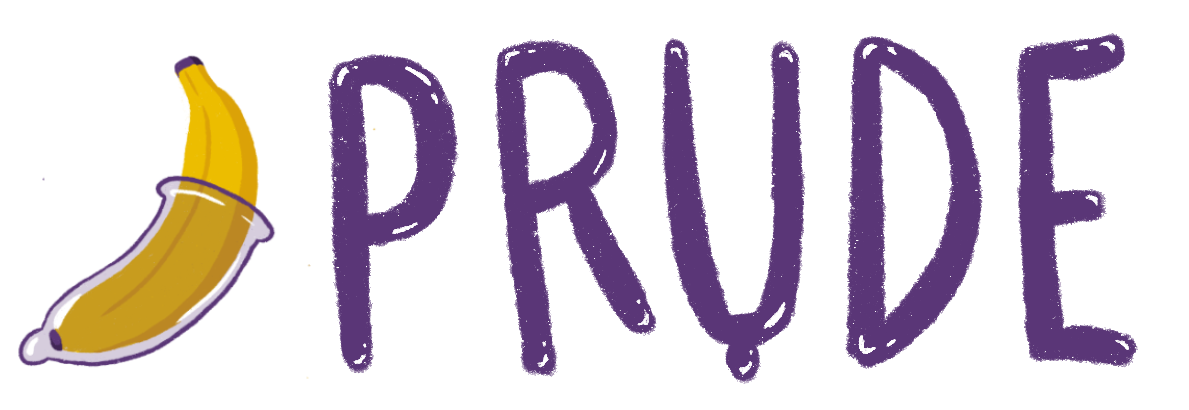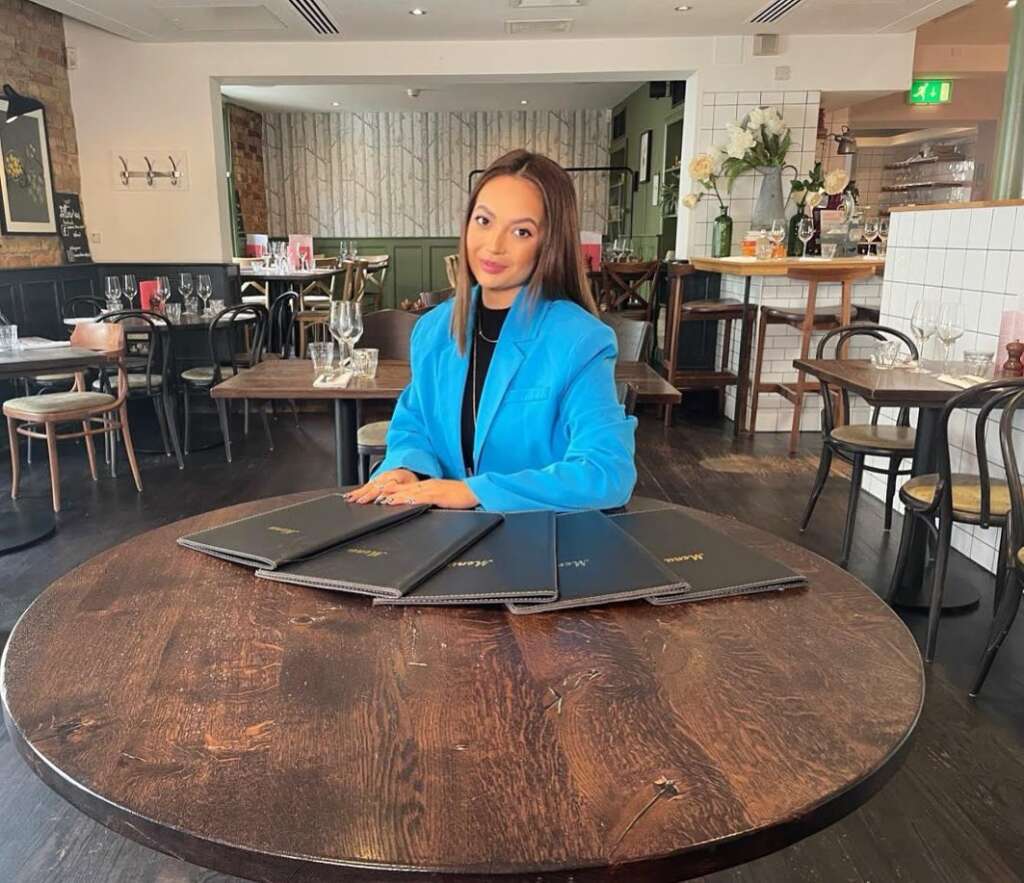Share This Article
“Sexuality is so fluid. I don’t think you can fit into one box.” Sharon Gaffka on navigating identity, being fetishised and dating after Love Island.
“Sorry, I’m just sitting in bed. I feel like I’m never in it anymore so I’m taking any opportunity I can.”
Sharon Gaffka lounges in front of a black velvet headboard, looking like she has just finished a photo shoot (which she might well have done) with perfectly slicked-back hair, flawless makeup and newly painted nails that feature elaborately designed Pokémon characters.
The 26-year-old former Love Island star, who appeared in the most recent season of the hit dating show, speaks to PRUDE from her chic apartment in Oxford. Sharon was a civil servant from the age of 18 until entering the TV villa.
One year on, instead of spending her time promoting the latest ‘fit tea’ or ‘car fragrance’, Sharon is using her 24 hours of each day as an activist for sex positivity. She’s a Young Woman’s Ambassador, driving an anti-spiking campaign and using her own experience of navigating her sexuality, as well as being fetishised as an Asian woman, to challenge how we talk about sex online.
Rather impressively, Sharon studied law at Birkbeck University and can speak three different languages; English, French and Indonesian. Since leaving Love Island, she has embarked on numerous projects including an Itty Titty campaign with Superdrug to encourage people to check their breasts for lumps.
But despite her good work, it seems the trolls still can’t be kept at bay. One of the first things Sharon mentions is a malicious comment she received on an Instagram post she uploaded a few hours ago. Soon after posting she was already being hit with hate, with a user commenting “don’t get spiked” under a snap of Sharon at a restaurant where she was filming for a recent episode of ITV’s Dinner Date.
With determination in her voice, she nods towards her phone indicating the comment and says: “I’m being trolled now for talking about spiking. People can say it to me because I’m unbreakable. But I’m not having that said to anyone else.”
The comment on Sharon’s Instagram – where she has over 350,000 followers – comes in the midst of her anti-spiking campaign. She has recently appeared on Good Morning Britain and has even been in talks with MPs about what needs to be done to tackle these attacks. The campaign is fuelled by the star’s own experience back in July 2020, when she was having lunch with friends and ended up in hospital after being found unconscious on the bathroom floor. Sharon discovered that someone put a “date rape drug” into her glass of wine.
The person responsible was never identified; by the time Sharon had left hospital on the evening of the incident, it was too late for evidence to be collected. Sharon tells PRUDE that she always thought it happened because of something she did wrong, and that it took her a while to openly talk about it as she was worried what people might say.
“One of the things I really want to tackle is victim-shaming, because I think that’s the biggest problem. People don’t want to come forward because of the shaming that comes with it,” she says.
This isn’t the only time Sharon has received comments from trolls on social media. She has also experienced hate regarding her sexuality: she revealed earlier this year that conversations she had with fellow contestants about how she identified were cut from the show.
Fellow Love Island contestant Faye Winter asked Sharon whether she was bisexual, which Sharon explained was something she’d explored but that she had never been in a relationship with a woman.
But instead of support, Sharon received backlash after the news of those conversations came out. “I remember seeing comments like, ‘she didn’t get a guy on Love Island and now she’s going to attempt women’ or that I had ‘betrayed’ the men on the show by also liking girls. I received a lot of bi-phobic comments.”
Sharon isn’t the only person to receive online abuse because of their sexuality. A report by GLAAD in 2021 found that people who identify as LGBTQIA+ are more likely to experience online harassment compared to all other identity groups. It revealed that 64 per cent of LGBTQIA+ people experience online hate, compared to 41 per cent among the general population.
Social media is a major driving factor in such figures. Sharon stresses that this is part of the reason why, for young people today, exploring their sexuality can be so challenging.
“I do think that in today’s society, trying to navigate your sexuality is harder. I’ve never really put a label on [it], I don’t really think about it until it comes to a job application or something weird like that. People were commenting that I have to fit a label, that I have to fit into one of these boxes. So, which one am I?
“Sexuality is so fluid. I don’t think you can fit into one box. But it’s hard. It’s really confusing for people that don’t know 100 per cent in their heart and haven’t really explored this.”
Luckily for Sharon, she grew up in a time when social media wasn’t an inevitable part of life as a young person. Navigating her sexuality was something she didn’t struggle with, as she had a group of extremely supportive friends around her.
She smiles warmly as she says, “I’m super fortunate to have the friends I have, so I personally never found it difficult. I am what I am, and my friends just accept it.”
Being of Indonesian, Polish and British descent, Sharon, who won Miss International UK in 2018, has also had to deal with discrimination because of her race, and says she often felt fetishised due to her Asian heritage.
“I think it comes from pornography, initially. When you look at pornography, it tends to be minorities and people of colour that are fetishised, like Black and Asian women. There are always those stereotypes that Asian women are physically different in their lower regions, and that they look different. So, I did find that happened before Love Island, especially on dating apps,” she says.
Since leaving the villa however, Sharon has experienced such attitudes less often due to her increased influence. “People are more cautious about what they say to me now, because I can expose them [on social media]. But before that, I used to get called a ‘banana’. Asian on the outside and white on the inside. So, people were saying I was whitewashed.
“I’d also get comments like, ‘Oh, you’re Asian, but you have a bum’. I’ve had white guys say to me that they don’t normally date Asians, because they’re ‘like ironing boards’.”

Exploitation of ethinic minorities isn’t the only issue Sharon believes comes from pornography. She also thinks porn is now one of the main ways young people learn about sex, due to not receiving a substantial sexual education in school.
Last month, in a survey by the Sex Education Forum, 33 per cent said they didn’t learn how to access sexual health services. And 46 per cent said they weren’t taught anything about sexual pleasure.
“I remember sex education as blue willies and learning how to put a condom on. That was it. And by the time [it was taught], I was already sexually active. So it was too late for me.
“There are loads of things now where young people turn to pornography to figure sex out. I was fortunate that I didn’t do that. I had a bit more of an innocent mindset when it came to these things. But sex education was bare minimum.”
Born and raised in Oxfordshire, England, Sharon explains how her parents, Robert and Linda Gaffka, have always been very conservative – talking about sex was never an option. She relied on her friends to confide in. However, she understands that lots of people don’t have someone to go to when they have sex-related questions.
“I know there’s lots of controversy around sex education, especially when it comes to religion. But at the end of the day, sex is normal. Everyone does it. When you make something a difficult thing to talk about, then young people will never talk about it, and then it becomes a problem.”
Consent is another topic that Sharon thinks needs to be spoken about more: “I know boys that pressured girlfriends into having sex with them and they don’t think that they did anything wrong,” she says.
Although TikTok seems like the perfect platform for sharing information about sex, Sharon is disheartened by the negative comments she has seen on her posts about consent and sexual assault.
“If I say something about sex then everyone is like ‘it’s a joke, find it funny. You don’t have a sense of humour.’ I have a really good sense of humour, but sexual assaults are not funny. Period.”
Motivation to advocate and educate people on important matters is something that Sharon has always fostered. It’s refreshing to see that she’s not just jumping on the bandwagon now that the spotlight is on her more, and is instead staying true to the same beliefs she has always had.

She recalls a debate she had in the comments of a TikTok video pre-Love Island about stealthing, which is the act of removing a condom during sexual intercourse, without consent from the partner. “Many don’t see that as a form of sexual assault because the person gave consent with a condom. But you took the condom away, therefore they’ve no longer given you consent.
“You could be damaging that person’s body if you’ve got an STI. Or, if they’re not on any form of contraception, you could get them pregnant.”
But why do some people think secretly removing a condom is okay? She responds: “People don’t see it as a serious problem. I think that’s because they’re not taught that it’s a problem. If everyone’s parents are like mine, where sex is not something you can talk about, then how am I supposed to learn? It’s something that schools have to step up and do more [about].”
Despite receiving backlash on videos, Sharon remains open and honest when sharing her opinions and personal life online. She recently started a blog where she speaks in very raw terms about a recent breakup she had with someone who she thought could have been the love of her life. She says the driving factor behind the breakup was that he struggled with her fame.
“I’ve been quite open about my recent heartbreak. Social media came into that and was partly to blame. That person knew what they were getting themselves into. It’s been less than a year since I left one of the biggest dating shows on British TV. I think they just found it too much in the end. So that is hard.”

During her time on Love Island, Sharon coupled up with Hugo Hammond and Aaron Francis, but she left the villa single on day 19 after a recoupling. Since leaving the show, her newly public profile hasn’t made it much easier to meet people.
She giggles slightly. “I mean, there’s a lot more to navigate now,” she says. “Dating apps are a weird experience because everyone thinks I’m a catfish, or they’re trying to get me to follow them on social media to prove that I am who I say I am. Dating apps are not really for me. It’s too intense.”
So, what would Sharon’s type be? “I personally don’t want to date someone who is on TV all the time, or in the public eye. It’s really hypocritical for me to say that because I am. But for me, it’s got to be a nice normal person with good morals and who will be nice to me. That’s all I want,” she says.
Leaning back against the headboard and taking a sip of water from her Volvic bottle, Sharon adds: “I’m going to focus only on myself. My self-development and my work. I’m just going to leave it up to fate, I guess.”
Enjoy this article? Read more here: “We work together, live together, eat together, sleep together”: Callum and Cole on their life as adult entertainers




1 Comment